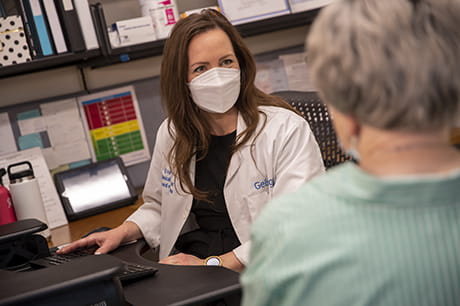What is a clinical pharmacist?
Learn more about these special pharmacists and whether you can benefit from seeing one.
You’re probably used to seeing your pharmacist behind the counter at the pharmacy in your grocery store or clinic, reviewing prescriptions and dispensing medications. But primary and specialty clinics can also have clinical pharmacists on staff, working right in your doctor’s office. They see patients face-to-face, and you can make an appointment to see them, too.
But what’s a clinical pharmacist, and how are they different from the ones at your local pharmacy?
Clinical pharmacists receive specialized training
Beyond the basic training all pharmacists have with medications, clinical pharmacists receive extra training that prepares them for patient care in a clinical setting. And the clinical pharmacists in specialty clinics have often had even more training to become certified in areas like pediatric, geriatric, cardiology or oncology pharmacy.
Clinical pharmacists work closely with your doctor
At your clinic, your clinical pharmacist is a full member of your care team. They work closely with your doctor. They can see your health history, make notes in your medical record for your doctor to see, answer questions about your health conditions, and help you understand your treatment plan.
You can make an appointment with a clinical pharmacist
And because your clinical pharmacist is a pharmacist, they have deep knowledge about medications, too. So if you have questions about how to take your medications, drug interactions, any side effects you’re having, or more affordable medication alternatives, consider making an appointment with your clinical pharmacist first. Often, you can get an appointment right away — faster than with your doctor — so you’ll get the help you need sooner.
Amanda Sember, PharmD, RPh, Geisinger clinical pharmacist, chose her career because she likes working with patients personally. “I can get to know my patients very well,” she says, “and I can help them tailor treatment to their lifestyle. And since I know their doctors, we can all work together easily to make sure each patient gets the support they need so they can stick with their treatment plan and stay healthy.”
Don’t stop or change a medication on your own
Having problems with a medication? Dr. Sember offers some advice. “Please, just schedule a short appointment with a clinical pharmacist in your doctor’s office to talk things over. That’s why we’re here in your clinic,” she adds.
And think twice before making changes. “Don’t stop taking a medication or change your dose on your own,” Dr. Sember says. “Discuss it first with your clinical pharmacist or your doctor. They can address any side effects directly, and if you decide together to make a change in your treatment plan, they’ll help you do it safely.”
You can count on clinical pharmacists like Dr. Sember as an integrated part of your clinical care team. “We’re right here to help you,” she says. “All you have to do is make an appointment.”
Next steps:
Get to know Geisinger Pharmacy
Manage your prescriptions on MyGeisinger
7 things you should know about SSRIs





